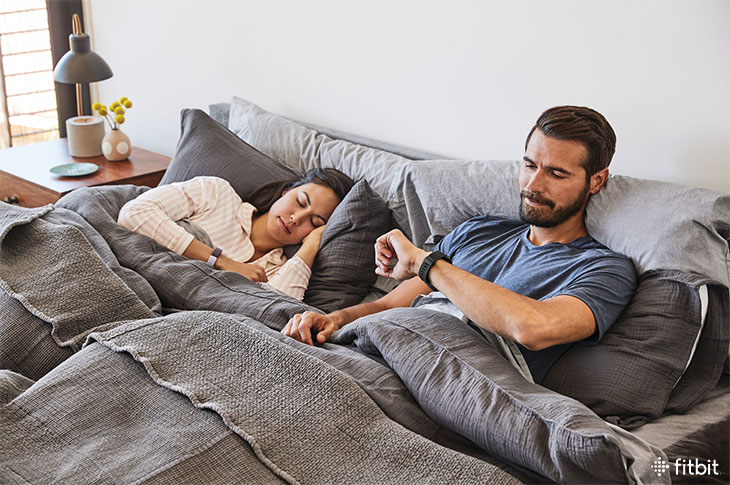
While you might be aware that March is National Sleep Awareness month and filling up your sleep tank is something you try to focus on as part of your overall wellness, there’s never been a more important time to prioritize sleep. Not only is sleep paramount to keeping your immune system functioning optimally, but getting good quality sleep before and after receiving a vaccination might help improve the antibody response, improving the vaccine’s efficacy.
If you’re able to and plan on getting the COVID-19 vaccine, clear your calendar for the next few days after so you can log quality sleep and give your body the rest it needs while your immune system gets to work.
“There’s something very special that happens during sleep, perhaps most precisely in slow wave sleep (the sleep stage most dominant in the first third of your sleep), that allows your immune system to optimize itself and rebuild,” says Alyssa Cairns, PhD, Head of Sleep Research, BioSerenity. Good quality sleep allows for those disease-fighting components of the body, like the protective cytokine proteins, to build and circulate, she says. “When you go to sleep, you’re allowing your body to produce more antibodies, which is important because we want to have a healthy immune response to the antigen [in this case, the SARS-CoV-2 spike protein].”
If your sleep has been a bit “off” since last March when the coronavirus gained footing in the U.S., you’re not alone. While Fitbit data shows that sleep duration is still higher than before the pandemic around the globe (as of November 2020), the American Academy of Sleep Medicine released a survey of data collected last July and found that more than 30 percent of participants reported that the quality of their sleep has been impacted by the pandemic.
To kick-start better sleep—and your immune system—this month and throughout the rest of the year, try some of these tips from Cairns.
Do a hard workout. “We know that cardiovascular exercise is really important for overall wellness, immune function, and psychiatric wellness,” says Cairns. “It also improves the continuity of sleep. If you exercise vigorously on any given day, you will sleep more consolidated. Your sleep will be heavier, with fewer awakenings, and you’ll wake up feeling restored. This is actually kind of counterintuitive, but you actually sometimes sleep a little bit less, but you sleep better and have more slow wave sleep on the days you do a hard workout,” she says. Even better? Exercise has been proven to improve immunity as well.
An easy way to tell if you’re working out hard enough? Tracking your Active Zone Minutes (AZMs) with Fitbit! AZMs are a personalized heart rate-based metric that tracks the amount of time Fitbit users spend engaging in a heart-pumping activity. The goal is to get to 150 minutes of weekly heart-pumping activity, as recommended by the World Health Organization and American Heart Association. (Learn more about AZMs here.)
Take that workout outside in the morning. When you exercise outside and social distance, it’s the most ideal way to exercise during COVID because you’re getting sunlight, even if it’s cloudy, as well as vitamin D, fresh air, and stimulation, says Cairns.
Take advantage of the morning sun in order to improve your evening sleep, she suggests. Doing this helps your body regulate its internal clock. “It’s very important to get out and see sunlight so that natural light can program the brain to be in line with the 24-hour clock,” she says. “This helps calibrate and synchronize the internal clock in your brain to the external clock, which is the sun.”
If your work schedule doesn’t allow you to exercise outside in the morning, spend a few minutes sitting by a sunny window in your home to help set your internal clock.
Get up after 15 minutes. If you find that you are having difficulty falling asleep and can’t break that pattern of overthinking, get out of bed after 15 minutes. “Move somewhere entirely different so that you can break that association and do something quiet and relaxing, like sitting down in a chair, and reading something calming until you start to feel sleepy again,” suggests Cairns. Don’t start scrolling or turn on the TV because light exposure can inhibit melatonin production and stimulate your brain.
Using your Fitbit tracker or smartwatch at night to monitor your sleep can give you some insights as to your sleep patterns and sleep efficiency. If you’re still struggling to fall asleep, you can also try navigating to the Fitbit app to listen to a relaxing guided meditation. You’ll be snoozing peacefully in no time after tuning in to one of Deepak Chopra’s sessions for restful sleep, available to Fitbit Premium* members through his exclusive wellness series, Mindful Method for Fitbit. (Learn more about the partnership here.)
Try some of the above tips this month and see if your sleep improves! Want more tips on getting better Zzz’s? Find out how to catch up on your sleep debt here.
*Check out Deepak Chopra’s Mindful Method for Fitbit, an exclusive new wellness collection featuring content across mindfulness, sleep, stress management, mental wellness, and the mind-body connection, available to Fitbit Premium members. Sign up for a 90-day free trial here. Not available in all markets where Premium is available; and available in English only.
This information is for educational purposes only and is not intended as a substitute for medical diagnosis or treatment. You should not use this information to diagnose or treat a health problem or condition. Always check with your doctor before changing your diet, altering your sleep habits, taking supplements, or starting a new fitness routine.

If you have questions about a Fitbit tracker, product availability, or the status of your order, contact our Support Team or search the Fitbit Community for answers.
Please note: Comments are moderated and may not appear immediately after submission.